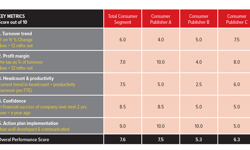A new national newspaper; an investment in journalism; new jobs; print isn’t dead yet. Hooray!
Upbeat and politically neutral; it won’t tell readers what to think. Hooray!
Aimed at (mostly) women who don’t buy a paper, it won’t trample on rival publishers’ territory. Hooray!
So it’s three cheers from the industry for Trinity Mirror’s baby, The New Day.
But will it work – and is it really good news?
Editor Alison Phillips has proved true to her strategy of tearing up traditional thinking. It’s bold and refreshing to try a different style of journalism, but it still has to be good. If you are going to produce a paper with a story count of about 20 – most of them briefs – the copy has to be superbly subbed to include every morsel of information. And you have to pick the very best stories to condense, not a ragbag of local paper snippets.
Here is an example from day one:
Parents welcome ‘miracle’ baby girl
A proud couple have described their newborn baby girl as a “miracle” after tragically losing four babies. Claire, 33, and Danny Davies, 36, from Atherton, Gtr Manchester, are “over the moon” with little Isabella.
Tragically losing four babies? How? What is the point of this story? Simply to warm the heart? Thousands of families have such experiences; to be newsworthy, this tale needed to be put in the wider context of multiple miscarriages, stillbirths and cot death.
Still with that first issue, the splash was about a boy of five who was “among a growing number of infant school carers stepping in to do the work of professionals as social budgets continue to be cut by the government” (politically neutral?). It’s a good subject, but was the story fair? Little Aidan says he likes to help his mother, who has a heart condition. But is he her carer? Read on and we discover that he has a brother of 17 and a sister of 13. So not quite as billed.
This all sounds nit-picky, but these details matter if you’re setting out to provide “essential” reading.
On the plus side, the layout is bouncy – although my designer friends all hate it – and some of the “explainers” are good. Phillips is certainly turning conventional thinking on its head by making page leads of the case studies that would traditionally sit in a panel, while relegating the news to the sidebar. Sometimes it works, sometimes the featured cases are so old that they obliterate the topicality of the story.
By the end of the first week, the flow of pages had been reordered and the paper has gradually become much newsier with more downpage stories getting a longer run.
They have attracted some respected contributors and the longer reads are generally well-written, but the news editing, writing and subbing are still not up to scratch - which isn’t surprising given that the editorial team is only 25 strong.
With a hundred journalists just put out of work by the closure of the Independent’s print edition, the appearance of The New Day is hardly a breakthrough in terms of job creation.
It might even prove the reverse.
If Trinity Mirror can make it pay with so few staff, that could reinforce other proprietors’ suspicions that journalists are an unnecessary expense. That might lead to further cuts and reduced investment in serious journalism elsewhere, resulting in a net loss of jobs to the trade and a general decline in quality.
Straw poll
There’s a big ‘if’ in that sentence. The key question is whether the paper will sell. In a straw poll of 20 non-journalist female acquaintances, none would buy it again. Here are some of their comments:
“It feels like a magazine printed on newspaper and it’s nowhere near as good as the i. Not too keen on it.”
“There are some interesting bite-size stories and it’s obviously an easy read, but I tend to use Twitter to tip me off for anything newsworthy and then delve from there.”
“I felt like I was reading a less celeb-heavy Grazia mag. I’d read it again, but only on a train and I would still choose Grazia over New Day. I don’t have time to read a paper. I just browse news sites online.”
“I hated the first couple of pages as they seemed like a light version of the Metro, but once I got past those, there were some quite interesting articles, which held my interest to the end.”
Perhaps the most interesting was from Catherine, a working woman in her late twenties who seems to be exactly the person the paper is aimed at. She emailed me one Monday evening:
“I bought the paper on Wednesday with the view to read ‘at my earliest convenience’. I still haven’t got round to it. In the meantime, I’ve glanced at BBC news while making my tea at work, watched it while having lunch in the canteen, found out about breaking news from colleagues, news app alerts and Facebook, and when I’ve wanted to find out more, I’ve looked at dailymail.com and the BBC news app.
“It seems a bit of a step backwards to bring out a new print publication. Even more so if their target audience is busy people. I personally would have preferred if they had created a new app / website. That way I can check the news when it’s convenient for me, rather than when it’s convenient for the publication.”
In a further unscientific survey, I asked the local newsagent how sales were going. I was the only person to have bought a copy. Up the road at the busy commuter station, the man who runs the news kiosk from 4am to 10am said he had sold three copies in two weeks, all to people seeking something cheap after the i had sold out.
Trinity Mirror had intended to double the cover price to 50p after the first two weeks and was aiming at a circulation of 200,000. But with sales reportedly hovering around 110,000 after the first ten days, that increase was put on hold “for a few weeks”. The paper is getting better every day, but now the novelty moment has passed, it will have a job on its hands to secure the hoped-for readership even at 25p.
I fear The New Day will prove a false dawn for print journalism.












